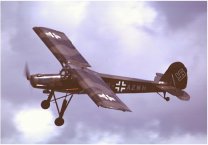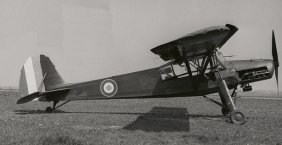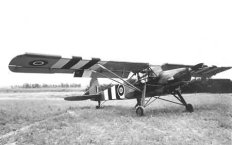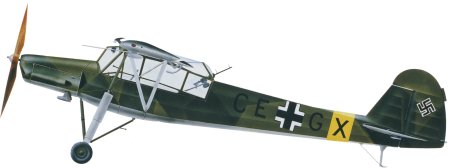
Fieseler 156 Storch
Gerhard Fieseler, an ace of the Great War with 22 victories, combined with designers Reinhold Mewes and Erich Bachem to create a most remarkable aircraft with the high wing, flaps and stalky landing gear needed to land and take off almost anywhere.
No allied warplane measured up to the Storch, which in a stiff breeze could land in a matter of metres. But apart from its obvious qualities as a liaison and spotter craft, the Fi 156 was incredibly versatile. It was so manoeuvrable at speeds of less than 55 km/h (35 mph) that it could elude much faster fighters; it could be rigged to drop small bombs and one was even tested against a U-boat with 135 kg (300 lbs) depth charges. There was seemingly nothing the Storch could not do.
In the end, the Fi 156 even landed and took off in a Berlin under siege from advancing Russian armies. The Storch outlived the Third Reich, and remained in production in Czechoslovakia and France long after the war.
A brilliant design, the Fi 156 Storch was so perfect at what it did that even if it was designed today, 60 years after its first flight, it could not be improved. The best observation and army co-operation aircraft of World War II, it had an almost unbelieveable short take-off and landing capability, reflected in an uncanny ability to operate out of restristed spaces and to perform a wide variety of liaison tasks.
 |
 |
 |
| The Fieseler 156 Storch was useful because the mountainous terrain was often only accessible to short take-off planes. |
Morane-Saulnier of France had produced the Fi 156 during World War II. After the end of the war, it built the MS.500, 501 and 502. A projected five seat version was not produced. |
The Fi 156C-5 was able to carry an underfuselage drop tank or an optional camera, and had an improved Argus 10P engine. |
|
Fieseler 156 Storch (Technical Specification) |
| Role |
Three seat liaison, observation and rescue aircraft |
| Manufacturer |
Fieseler |
| Maximum Speed |
175 kmh (108 mph) |
| Maximum Range |
385 km (239 miles) |
| Ceiling |
6,800 meters (22,300 feet) |
Weight
Empty
Maximum Takeoff |
930 kg (2,046 lbs)
1,325 kg (2,915 lbs) |
Dimensions
Wingspan
Length
Height
Wing Area |
14.25 meters (47 ft)
9.90 meters (32 ft)
3.00 meters (10 ft)
26.00 square meters (280 sq ft) |
| Engines |
One Argus As 10C-3 inverted Vee 8 air-cooled piston engine which provides 179-kW (240-hp) |
| Armament |
One 7.92 mm (0.3 in) MG 15 machine gun with four spare 75 round magazines |
Photo Gallery
Click here to submit your photo
| Have A Passion For Aircraft? |
Subscribe to our 14 series FREE newsletter
delivered weekly on World War 2 Aircraft factfile... |
| NB:- We hate spam as much as you do, so your email address will NEVER be shared with or sold to anyone else. That's a Guarantee. |
|
|





